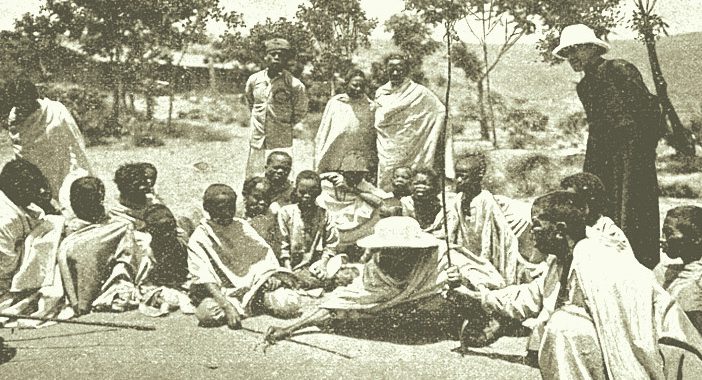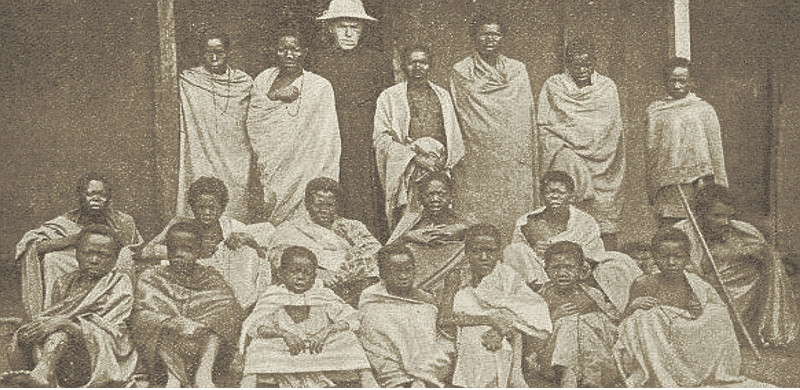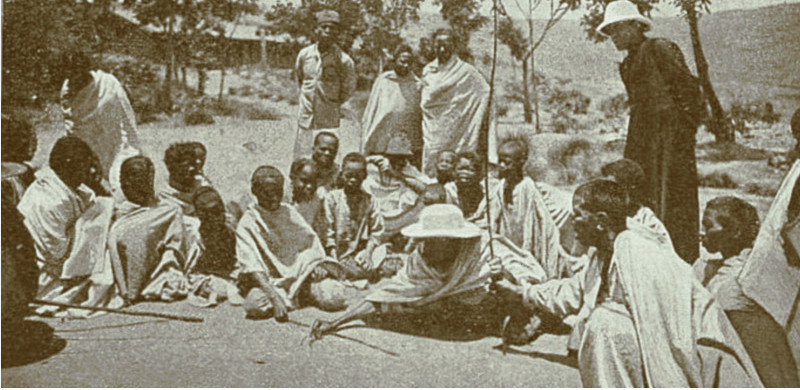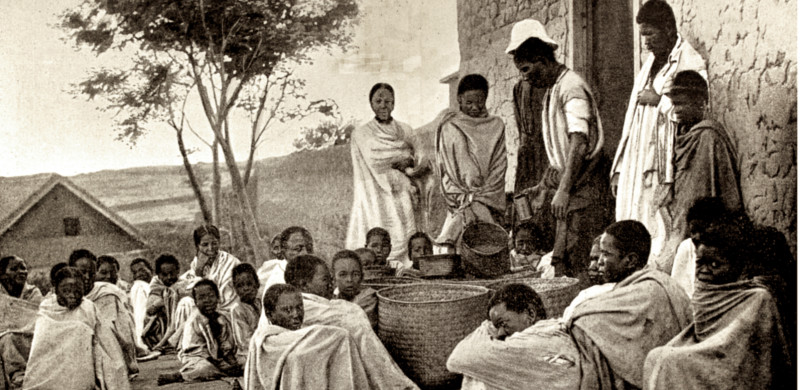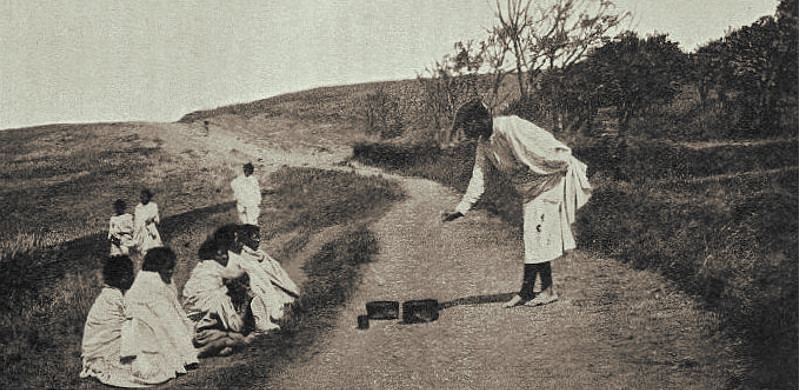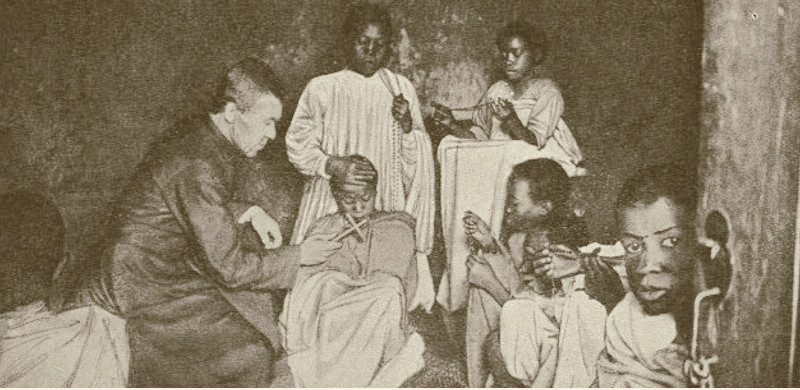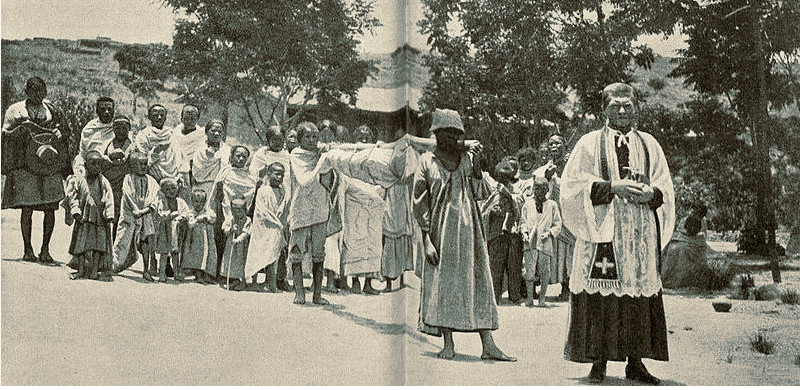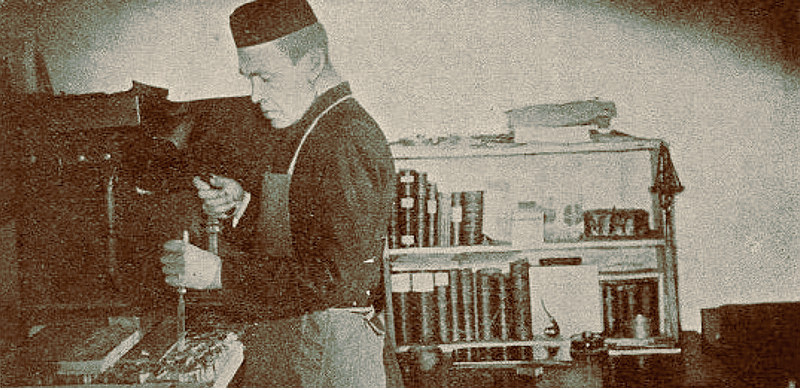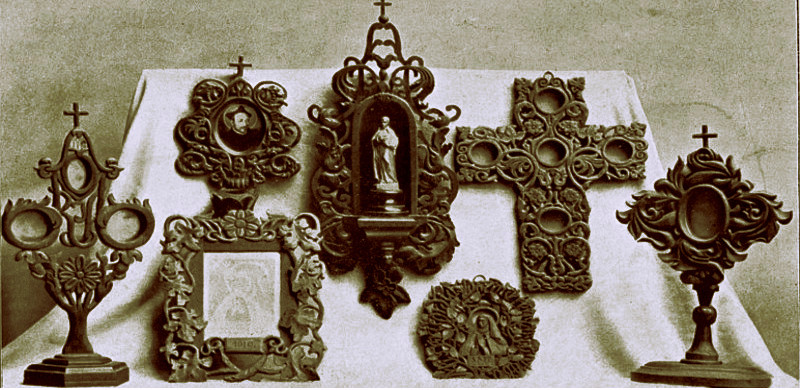The allegations against Father Beyzym and the leprosarium construction difficulties tormented him and saddened. He expressed his feelings in his letters to Father Czermiński. He sometimes was outraged at French and would fearlessly speak his mind. In his letter to Father Assistant Włodzimierz Ledóchowski, Father Czermiński wrote about the reasons of Father Beyzym’s troubles with French. The wounded vanity that a Pole, on the money from Poland, started to really and truly take care of the lepers and erected a proper leprosarium was a true reason of their dislike and aversion for Father Beyzym. In addition, that very dislike, aversion and the difficulties he experienced, stimulated his desire to go to Sakhalin.
Father Łukasz Łaszczyk, Father provincial Associate, wrote to Father Assistant Włodzimierz Ledóchowski that Beyzym had been sending sad letters from Marana, that he was absolutely discouraged with his work and wanted to go to Sakhalin to Polish prisoners. Practically speaking, from the very beginning of his work for the lepers, Father Beyzym experienced never ending hardships. Standing up for the sick that were entrusted to him, he risked to be accused of being “harsh, inexorable and stubborn” (“bristles up”,- he wrote to Father Romuald Koppens)
In his letters Father often complained on his grievous state of mind. That he was sad, that he had to swim against the tide, that he fought like a fish on the ice or sand, that he felt like a dog on a chain, that he had mood swings. “I have been fighting for everything; have been swimming against the tide for 12 years. That is why I have such mood swings and sometimes can even say something harshly”.
He was in such bad mood sometimes that he “could get crazy or furious”, but even in such vexation he tried to find the will of God. And because Our Holy Mother saw it, he moved on... Filled with anger because of the drawbacks and hardships he experienced from the French, he “would swim to the country, but stayed as it was the will of Our Holy Mother”. If he did not do everything for Our Lady, “he would not be there by now”. For being healthy and not going mad, he was grateful only to Our Lady. And if he had not been certain that Mary had managed everything, he “would have left everything behind and returned home”.
THE BITTER BREAD AND DAYLY CROSS
What was Father Beyzym worried and tormented with? What was his day-to-day bitter bread and cross? He clearly expressed it in his letters to Father Czermiński: Bishop Cazet had delayed the leprosarium construction for four years, Father Alois Verley, the Superior of the Mission, would take his workers from him. The construction had been delayed for 5 years. Everything that was already built – was falling into ruins. The cost of the construction doubled. The leprosarium issues were ignored and neglected.
In 1910, when the construction was practically finished, Father Beyzym confronted the difficulties again. That time he neither wanted to give up his work, nor return home, but being God’s will, he wanted to go to Sakhalin. He saw there greater glory of God and greater good for the perishing souls there. If there were no possibility for him to go to Sakhalin, he would stay in Marana, being sick and tired of all the hardships. He felt like a fish out of water.
The difficulties, connected with the leprosarium construction, he viewed as “the crosses of Jesus”. They were to be accepted and overcome. But, “humanly, I have enough of all those Cazets!” At the beginning of 1911 Beyzym wrote to Father Czermiński: ”Either not to interfere in the inauguration of the leprosarium, or have him (Beyzym) sent to Poland”. The difficulties in the leprosarium construction and finishing off were endless: ”everything goes wrong, but one needs to continue, as “through the cross to the light”. Jesus and Mary saw everything and it was his only consolation.
This humble and anguishing man started to think that those hardships and drawbacks were because of his lack of mortification. He had hard times. He did not know what to do – “to cry or to swear”, but maybe it was he himself to be blamed? That was why he often asked Lobzow Carmel nuns to pray for him, “for he was boiling inside”. But he expressed his regrets to God for his bad mood and impatience.
Beyzym was realistic in his care for the lepers. He did not agree to any “temporaries” in relation to the leprosarium construction. He was aware that “later” meant “never” and “tomorrow” was not the food for his patients. He thought that construction had to be done responsibly, modestly, but firmly. “It must be done as it should be done”. In his realism he defended himself against every “it seems to me” and all the “imaginations” of different kinds. He was reliable in his letters. He only wrote about the things that he was convinced were true.
He was prudent and asked for advice. He was also discreet and only to the trusted friends (never to the “Catholic Missions”) he would write about his misunderstandings with the fellow brothers from Toulouse and later from Champagne Provinces.
Speaking about spiritual matters, Father was realistic, prudent and cautious, especially if it concerned extraordinary signs and manifestations. In such cases he demanded the life test and directed to the confessor and superiors.
HE ALWAYS WROTE SINCERELY, OPENLY AND ONLY THE TRUTH
Beyzym is his letters too. He wrote lots of them. He wrote them willingly, for the reasons of the heart and friendship, for companionship and to “talk” in Polish with his close friends, for the good of the lepers – asking for elms and thanking for them as well.
As everything he did in his life, he wrote his letters with Mary, asking Her for help, commending the addressee to Her and sent the letters with Her blessing. He was confident that it was Mary’s deed that his letters were so popular and did so much good. He always wrote them sincerely, openly, only the truth and without the exaggeration, so that later he had nothing to explain. He did not like grandiloquent letters and hated elevated artificial style. What was in his heart – that was on his lips and under his pen. He would use expressive, apt Polish and Russian proverbs in his letters and even prepared the list of them for Mother Ksawera (he could probably be the patron of paremiologists).
His letters were published in the “Catholic Missions” and were also published in a book version (the 5th edition was in 1927). They were very popular and were compared to the popularity of such books as Robinson Crusoe and Rinaldo Ronaldini. He was deeply surprised by such popularity and attributed it to Our Holy Mother.
While writing the letters out of a heartfelt need, he expected them with the longing in his heart, as the letters from Father Czermiński, Carmelite nuns were his spiritual food, his consolation and joy.
The style of Father Beyzym’s letters is simple, factual, informative and often jocular. He had a lively sense of humor and aptness of critical observation. He mocked himself more often than not. He also mocked others sometimes, but always kindly, without sarcasm. His letters to Mother Teresa from Wesola Carmel are the good example of such humorousness. Father’s letters to his confreres Jesuits from Poland were full of humor and cheerfulness.
All the letters written to Father Beyzym did not remain. There were so many of them that he did not have place to keep them and they were simply destroyed.
I’LL LIGHT MY PIPE AND LET MY MISFORTUNES GO WITH THE WIND
The personality of Father Beyzym would not be complete without his pipe. He smoked cigarettes and would offer them to his patients to reconcile the feuding sides. He smoked his pipe when he walked (“I even light my pipe while walking”), he smoked it while bandaging the lepers to neutralize the odor of their putrid wounds and also smoked it “for fantasy”. “I’ll light my pipe, let my misfortunes go with the wind, then joke with the sick and it goes on somehow”. There were times, when it was difficult for him to write the letters, but “now to write a letter is like to roll a cigarette”. He warmly thanked Father Kraupa for his present - the tobacco case.
“The lepers’ servant”, burning in his sacrifice, looks plain and ordinary thanks to his pipe and somewhat closer to us. He did not drink alcohol, did not eat meat, worked hard and fasted constantly. The pipe was his only “indulgence”, some sort of defense against the spiritual pride and spiritual vanity. The pipe gives a shade of human ordinariness, even weakness to his life. Father Beyzym wrote to Mother Kazimiera about Father Kraupa “that he is one big heart. He can do nothing else, but love God and neighbor”. The same can be said about Father Beyzym. He was one great heart that was full of serving and humble love in the most difficult serving conditions and to the very end.
Let us finish with the words of Anne Marie of Visitation, his colleague and a nurse, who looked after Father during his last illness: ”Neither father nor mother could be able to express more dedication, I would say – tenderness – to their children than our kind Father gave us. And in that, above all, the greatness of his heart was revealed. All that he did, he did nicely and spiritually. He would always tell his funny stories to cheer us up in the moments of sadness and grief. We feel terribly alone after our dear Father left us”.
Father Mieczysław Bednarz SJ
